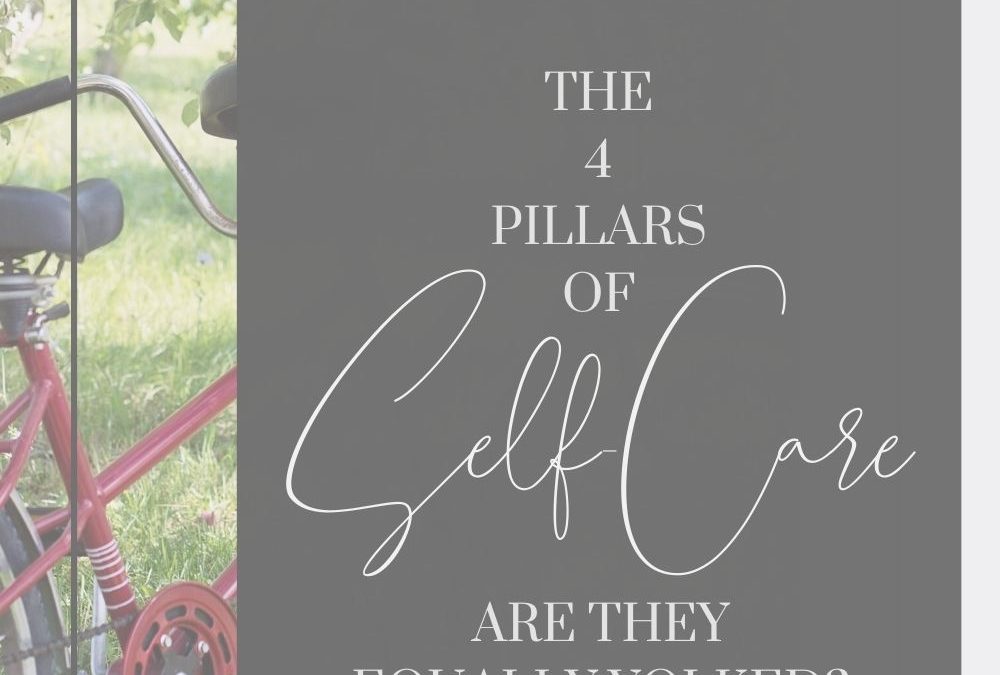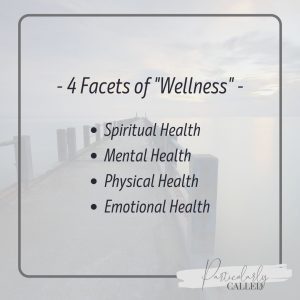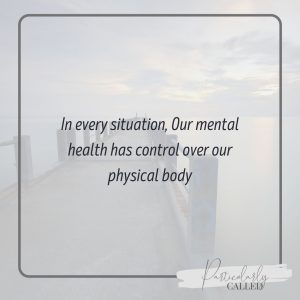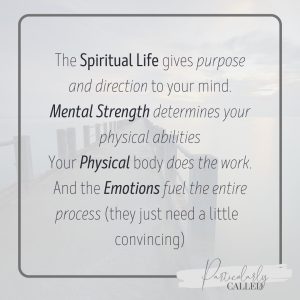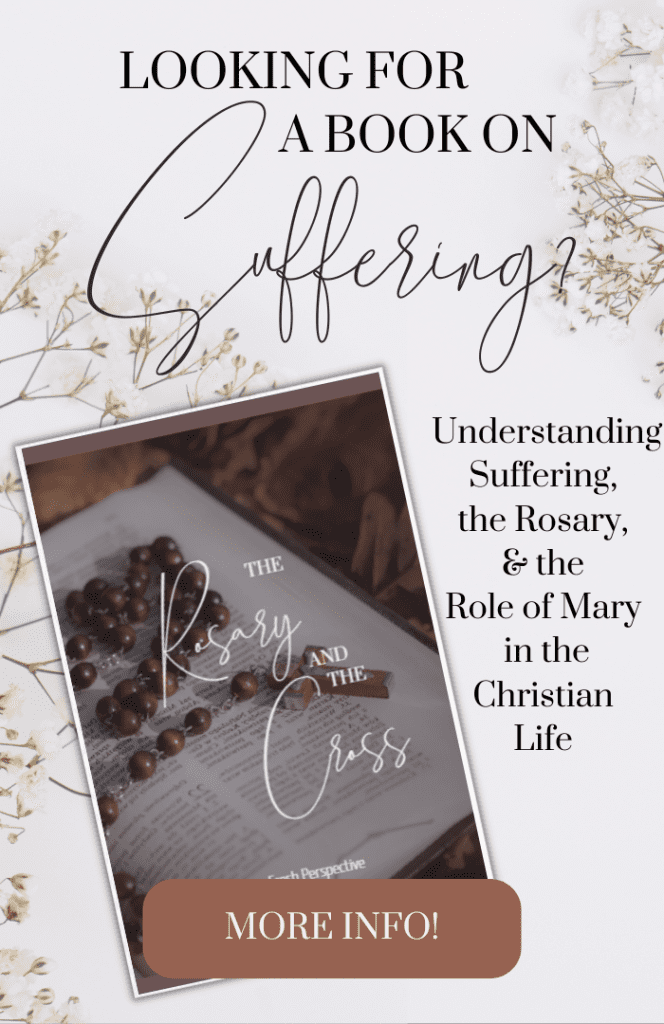I’ve often heard of the 4 “Pillars of Self-Care” (also called “Levels of the Self”/ “Aspects of Personhood” / “Facets of Wellness”) described as 4 legs on a table – you know, where if one of the legs is weak, the table is unstable? It’s an analogy I have loved and ascribed to for a long time, however, lately I have started to like to think of them more as passengers in a car… or maybe even more accurately, a 4 person tandem bicycle.
The 4 Facets of Overall Wellness
Just in case you haven’t heard of these classified as such before, there are 4 aspects or areas of personhood. We also often like to call them “healths” without realizing it.
- Spiritual health
- Mental health
- Emotional health
and, of course,
- physical health
(Some people also add Social, Environmental, and Occupational Healths here too, but I believe the first 4 rather encompass the other ones)
Let’s just review them quickly:
Spiritual Health
As spiritual beings we have a desire to matter, to belong, to love and be loved, to have purpose and direction, and to be part of something bigger than ourselves. We question and contemplate things beyond our immediate reality such as God, immortality, why and how things work, morality, ethics, philosophy, etc, etc, etc. Thus, figuring out our Spirituality is extremely important, because it is a fundamental part of WHO WE ARE as human beings!
Mental Health
Mental health is obviously soaring in priority and awareness lately because of how much science has discovered about the power of our mind over our bodies. The hormones released by brain function have control over our physical health, over our muscle function, over addictions, and over healing, just to name a few. The will to live is a real thing! How many miracle, underdog true story movies have we seen of someone defying a devastating prognosis? How many elderly simply die of loneliness or a broken heart? Why did some soldiers or fever victims on past centuries recover and some not? It is because our minds are strong (or at least they should be), and it is such a beautiful thing that we are beginning to become ever more aware of the influence they have over our lives and our overall health.
Physical Health
Physical health has been a big deal for a while. Since the 80s we’ve been realizing the increasing value of physical fitness and exercise not to mention our ability to influence, improve, and or protect our physical health with hygiene, and better nutrition. The average life expectancy has gone from 35 to 80 years in the last 200 years with the improvements of science and medicine.
Emotional Health
Emotional health, well you know what it is. You feel emotionally healthy when you feel happy, calm, at peace. We love to feel loved and in love. We prioritize pleasure, endorphins and dopamine. We know those are helpful for staying motivated and active, which is obviously good for us. But should it be our sole priority?
Equal or Prioritized?
Clearly these are all important, and all of them beautiful, true and good – created by God that we can be true images of Him.
But are they equal?
The analogy of the table suggests that each leg is of equal importance and that we need to constantly pay attention to all 4 aspects in order to keep ourselves strong and steady – and ultimately valueable. It’s hard to do much on a table with damaged legs.
So we fight.
Those of us who are exceptionally self-aware, distinguish between the 4 aspects of personhood and we read all the articles trying always to optimize all 4 of them, but it feels like waging a war on 4 fronts. Each one needs constant attention and it quickly gets overwhelming. Most people pick the one that makes the most sense to them and focus there, using that one area to essentially pull the others into line.
That’s why I like the analogy of the tandem bicycle.
It’s one vehicle, one life. Moving in the direction of whichever faculty is in the driver seat. The other faculties are just the team work and the leg muscle (because it does take leg muscle) that gets us to the destination.
Common “Seating Arrangements” (Scenarios)
Let’s examine what it could look like if we put each of the different faculties in the “driver’s seat”.
Maybe you know someone who prioritizes emotional health.
Their physical activity serves their emotional health, the way they choose to think (mental) serves their “emotional health”, and the choice to believe or not believe, practice or not practice a particular spirituality, and which spirituality they choose all have to align with whatever makes them “happy” in the moment. The problem is, our emotions by their very NATURE are a fickle and unrelenting mistress and it is impossible to manage to make them consistently stable – while we live on this earth and interact with other people and problems, that is.
We all know someone who prioritizes fitness or nutrition.
Their lives are completely dictated by meal plans and exercise routines. They have high endorphin levels because exercise is excellent for emotional health. But they struggle to enjoy time spent with family or friends because it interferes with their rigorous routines – whether it be of sleep, beverage, exercise, or special diets, they can be so extremely rigid that the only people they can be “themselves” around are fellow fitness gurus. They have strong mental health that helps them push through barriers and preform amazing feats of dexterity, endurance and strength, but at the end of the day, they still grow old at some point, injuries almost always become a factor, and life doesn’t revolve around one’s physique – not forever anyway.
Prioritizing Mental Health
The mental health area cannot function on its own. It always has to be at the service of another faculty, because mental health, by its very nature, has to have some kind of goal in mind, some purpose to work towards that give it focus and direction. Even if that goal is somewhat vague like “happiness” (Which most people seem to believe would be constant dopamine levels) or breaking through fitness barriers.
Of course, there are some intellectuals who pursue knowledge for the sake of knowledge. They sit in their fancy offices, courtrooms, classrooms, and boardrooms, looking down their noses at ordinary plebeians as they argue all day about nothing, trying to prove their superior mental prowess while the rest of the world remains completely unaffected. They often become dry, unapproachable, and proud – wondering why no one is following them around eating out of their hands. Their physical health is not as important for their profession of choice and they get all their emotional satisfaction from their “intelligence”. Spiritual health could be something they pursue intellectually, but it doesn’t much impact them otherwise, so it’s almost like the spiritual seat on the bike is empty all together – dead weight to be carried around by the other 3. It doesn’t have to be a bad life until you start to wonder what the point of it all is anyway, or until you realize that your pride has estranged you from the rest of society (including family).
But what about Spiritual Health?
The spiritual life is the most “nebulous concept”. The most “uncertain”, the most “confusing”. The other ones are more visible, more tangible, more obvious. (Which is why people naturally choose to pursue them more often). The spiritual life makes you question if you are making progress and wonder how to gauge it. You have to have “faith” that you are pursuing something real, something worthwhile and something that will actually meet the needs of the other 3 faculties. It’s scary because it is “invisible”, but at the same time, somewhere deep down we know we are made for it.
The spiritual life answers all the deepest questions of the heart of man.
Who are we and why do we exist? What is the role of death and suffering? What is love and how to keep it undying?
The spiritual life is the ONLY guide in the “drivers seat” that made any sense for thousands of years. If you think about it, what sustained humanity before massages, margaritas, and lounge chairs? Somehow for centuries we built entire civilizations and conquered whole continents, but now we can’t even get through the day without a latte.
I wonder what changed…
The human heart is ultimately looking for something that transcends human emotions and the physical form to give them meaning, purpose and direction. The ultimate fulfillment of the mental/intellectual life is the grasping of Truth as it is, that is, God Himself, the Source of everything we know as reality. These fundamental longings are part of what it means to be “made in His image and likeness” not to mention the reasons why only the pursuit of the Spiritual life can ever truly fulfill our deepest longings.
I am the way the Truth and the Life. – John 14:6
(Read Also: Why you might be WRONG about your calling!)
When Spiritual Health Leads
So, what if we put our spiritual health, this genuine pursuit of God, in the driver’s seat of our bicycle, and the other three fell in line (as they naturally do when one takes the lead), what might that look like?
Seek first the kingdom of God, and all these things will be given you besides. – Matthew 6:33
Most people are aware of the fact that science has discovered how much control our mental health has over our physical bodies. When our brain is healthy it impacts weight loss, muscle function, the ability to heal and overcome addictions. It enables us to be clear on the right choices to make and to have the conviction to follow through with them even if they are challenging. It provides motivation to keep going even when our emotions aren’t exactly on board (aka when we don’t “feel like it). So, mental health would take the second seat.
Next would come our physical health. Once the Spiritual life gives the bike direction and purpose, and the mental health gives us the conviction and the motivation, Physical health gives us the actual motion. It is the legs of this operation. It is how we ACTUALLY carry it out. It’s how we, as physical beings, actually move and pursue God. This is a physical process and we cannot forget that everything is connected. This is a process that does not leave out any of the fundamental aspects of human existence. This is why things like fasting and mortification matter – because they are physical ways of pursuing God. It’s also why doing demanding physical activities such as working out, keep our bodies strong and increase our mental strength as well.
The last man standing is our emotional health. It may seem inconsiderate to leave this one ’til last when so many believe he should be first – after all, he is the most powerful/”motivating” of the 4. Am I saying that God does not want us to be happy, or that we should disregard our emotions or that they do not matter? Absolutely not. Quite the contrary. I am saying that the emotions will follow.
Undirected and unchecked, our emotions are fickle and impossible masters that are the most easily manipulated of all our faculties. They are the reason we need grace. Grace quiets, molds, and directs our emotions to help fuel us toward what is good. Which is why the pursuit of God is very much in line with the pursuit of Grace. And, while our emotions won’t remain unchanged in the pursuit of God, the fact that the whole process quells their objections and brings them “into line” with the others in tandem is a breath of fresh air for the other faculties and alone provides renewed strength and vigor.
Every once in a while God, in His goodness, will touch them with just enough to renew their strength or vigor or reward them for their cooperation. This is one of the roles of Grace – the free gift that surprises us, rejuvenates us, and keeps us going. This is also the reason for traditional aesthetic practices in the history of Christianity. Spiritual disciplines help to form, direct, and “mortify” our emotions (or “inclinations”) to help them recognize and cooperate more readily with Grace on this journey. This cooperation with Grace is what our Emotions were made for. It awakens the deepest part of our souls and makes us realize who we are and what we are made for, thus providing the ever increasing fuel that literally powers us through an entire lifetime of loving, and joyful, pursuit of God.
The most dangerous scenario here
Some people might get their ducks in a row and put all 4 in their proper places on the bike, but then they hesitate. They get unnerved and begin to doubt before they even start moving because Emotion is throwing a fit about being put in the “back seat”. Maybe they even start moving but they keep stopping to find ways to appease the whiner in the back.
Not only does any possible amount of progress get sabotaged but also Mr. Emotion will never be satisfied, not until he sees that things are going well. (Then He will get excited). But meanwhile, He’s nervous to see what He is made of and nervous to leave his comfort zone.
The reason this is dangerous, is because we think we put Spiritual Health in the driver’s seat, but if we allow Mr. Back Seat Driver Emotions to control the progress of the bike for too long from the back the other 3 faculties will give up trying to lead and he will usurp the driver’s seat without you hardly even knowing it happened. (And likely in denial that such a mutiny has even occurred).
This is why some people feel the need to ask the ask the question – “How do you pursue the spiritual life and still make room for self-care?” Or “What is the role of Self-care in the spiritual life?” (Because they identify the self with the emotions and they are used to the emotions steering the tandem).
The most dangerous scenario is that a person doesn’t know which faculty is driving their bike (or the reality isn’t the one they thought it was).
If you aren’t making progress toward your goals – Spiritual, Mental, or Physical – it’s likely that they are no longer steering the bike.
Maybe it’s time to check in.
Conclusion – A Summary
Yes, this article was long and a little bit challenging to grasp without spending some time chewing on it. So, I invite you to find a chance to chew on it –
Meanwhile, here it is in a nutshell:
- to explain how the 4 Dimensions of Wellness all play critical roles in our overall wellbeing
- to debunk the myth that all are of equal value – everyone always prioritizes one over the rest and the others always serve the purpose of the one in the driver’s seat
- to explain how Spiritual Wellness is the only one that gives life meaning and purpose – It is a natural compass that we need to learn how to read – but, as the navigator, it should be the driver’s seat of our bike if we are looking for true and lasting fulfillment
- To explain how spiritual wellness, informs mental health, which in turn informs physical health so they need to be in that order “on the bike”. Mental health is the encourager and Physical Health does all the actual legwork.
- Emotions may throw a fit about being put in the back seat but once they see how well things are going (if the first 3 are able to carry on and ignore all the complaining at first), the momentum will bring the emotions around, and then the emotions (guided and molded by the outpouring of grace which will be a natural result of the upward spiritual momentum) will be the unstoppable force that moves your bike – which hopefully still has a strong driver in charge.
[mailerlite_form form_id=1]
